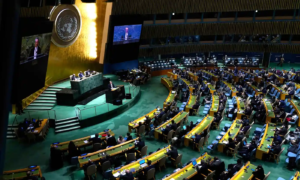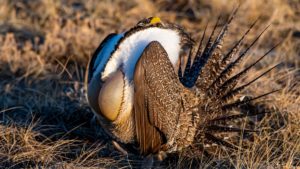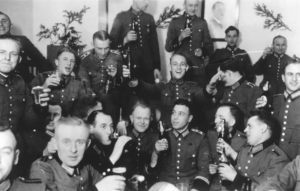Across the country, citizens have been walking, driving, marching, running, dancing — even doing group motorcycle rides — to polling sites during the early voting hours of 2020’s general election.
Others, meanwhile, have been riding horses to voting stations, part of a Navajo Nation voter mobilization effort led by activist Allie Young, who recently shared on Instagram that she “did a thing” with her dad and their voting squad in Kayenta, Ariz.
“We saddled up our horses and rode 10 miles to the early voting polls to make our voices heard by casting our ballots. We rode in honor of our ancestors who fought for our right to vote. We rode in honor of our ancestors who rode longer miles and hours just to exercise their right to vote for us, our people, our lands, Mother Earth and Father Sky, and future generations,” Young shared on Oct. 23 in a post that’s since caught widespread attention, including from Michelle Obama.
That event, in which 15 members of Navajo Nation rode 10 miles to the nearest polling site (with another 15 opting to drive) was the first of three such events — the second being in Holbrook, Ariz., and the third, in a return to Kayenta, planned for Election Day. Young says she’s hoping for a turnout of 40 to 50 riders on Tuesday and notes that the inspiration for the events was twofold: Rodeo culture being popular within the Navajo community (including within her family, a “long line” of bull riders), and the vision of her father, who grew up in the area and works in Kayenta as a substance abuse counselor.
“I’ve done so many trail rides with my dad, that’s our thing — one time did a 6 or 7-hour trail ride — so that’s a way that we connect and we bond. It really came from there,” Young tells Yahoo Life about the series of rides to the polls, which she’s doing in partnership with When We All Vote. “He had this vision that we were riding to the polls — and, knowing he didn’t want to participate in this election, I was like, ‘Why don’t we do it? He then got excited about it, which I think motivated him to cast his ballot.”
Young, 30, who works full-time for Harness, an L.A.-based nonprofit co-founded by America Ferrara to help celebrities and influencers use their platforms to spread messages of larger good, got her first taste of organizing in 2015 when she was part of a walkout from Adam Sandler’s film The Ridiculous Six to protest offensive depictions of Navajo women. She wound up also forming her own nonprofit (under the Harness umbrella), Protect the Sacred, to empower and educate Navajo youth and young people throughout Indian Country in the face of the COVID-19.
The pandemic has ravaged the Navajo Nation, which spans parts of Arizona, Utah and Nevada, seeing over 11,800 cases and 580 known deaths; on Sunday, according to the Navajo Times, the percentage of people who tested positive for COVID-19 was 21.4 percent, with the seven-day average positive test rate at 12.4 percent. Last week, the Nation reported its highest daily number of new COVID-19 cases since June.
“We already have trust issues with the federal government, so when things like this happen it discourages us,” says Young, referring to the delay of pandemic federal funding, which “put us in a position where we became the No. 1 hotspot in the nation,” not to mention the other contributing factors to COVID-19’s wrath in Indian Nation — including limited health services, a broken infrastructure and above-average rates of lung and other immune-compromising diseases thanks in part to uranium and coal mining that polluted Navajo land.
“We’re at the point now where just about everyone knows someone who has passed away… My dad lost a nephew,” Young says, adding that the devastating effects of COVID-19 can “even be boiled down to our treaties with the government — we’re supposed to be guaranteed quality health care and education, and the pandemic and how we’ve been hit has revealed that that’s not the case. We have poor health care and so many broken infrastructures,” with many rural homes having no electricity or running water, further contributing to COVID-19’s spread.
“It’s 2020, and I don’t understand why that’s still the case in our communities when, through our treaty rights, the government should be providing resources to fix those issues,” she says.
That, in addition to a long history of Navajos and other Native Americans feeling disenfranchised — thanks in part to voter suppression in the form of not enough accessible polling sites, which Young says is a problem in the current election — has long dissuaded many in Indian Country from heading to the polls.
“I saw one campaign that was actually discouraging people from voting – from participating in a colonial system that’s never worked for us,” she says, noting that it echoes the frustration felt by many people of color in America. “There’s this resistance to participating in the system. And I was fearful of that… We need their votes. Our ancestors fought for the right to vote.”
Now, she says, since that first ride to the polls, her formerly politically-unmotivated father has had a change of heart. “He’s been telling me how this has really activated him again and, in a way, given him life and strength and excitement.”
Further, Young has heard from people all around the country, of many backgrounds, who have been moved by her effort. “It brings tears to my eyes,” she says, “because a lot of our people are feeling inspired… Even if they’re not making it to the trail rides, they’re sending messages saying it’s inspired them to vote… especially in honor of people who died of COVID and cannot vote now.”




